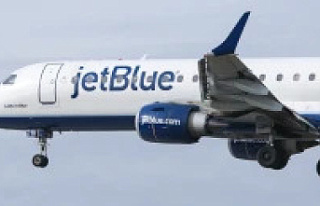Jaxtyn Bryant, Dorina Bryant’s baby, was just 2 weeks old when he contracted a virus which left him in hospital last summer.
His blood oxygen levels were extremely low, and his tiny chest was a swell as he breathed. He was positive for the respiratory syncytialvirus, or RSV. He was sent home despite his oxygen levels dropping to 84 percent (95 percent is normal)
Bryant, a Broken Bow resident, drove Bryant more than two hours to another hospital. His family waited for two days before Bryant could transport the baby to a pediatric intensive-care unit at a children's hospital.
Jaxtyn took two months to fully recover his lungs.
Bryant stated, "Every time he coughed you could see he needed more healing time."
Hollie Poore was in a similar position a few months later in November 2021. A cold had struck her entire family, six in all, in South Jordan, Utah. Susie, her 3-month-old daughter was still suffering from the symptoms. Jaxtyn also tested positive for RSV, and the infant was sent home. Poore brought her to the emergency department hours after her baby was sent home. She noticed that her daughter's lips were turning blue as she waited in the waiting area.
Poore stated, "Immediately, there was a lot of doctors in the area putting an oxygen mask onto her and admitting to the ICU."
RSV is a common infection in children under 2. Most infants will experience symptoms similar to a common cold. However, the respiratory virus can cause serious complications in very young children.
According to Centers for Disease Control and Prevention data, Jaxtyn and Susie were among nearly 60,000 RSV-infected children each year. Both survived, but RSV can kill up to 200 children younger than 5. Covid-19 has claimed the lives of just 300 children aged 4 and below.
RSV is the leading cause of respiratory tract infections in children younger than 5. Dr. Anne Moscona of Columbia University, a virologist as well as an infectious disease physician, said that RSV is the No. 1 cause of these infections.
For decades, researchers have been trying to find a safe, effective and affordable RSV vaccine. A new study published in the New England Journal of Medicine Wednesday shows that an injection can protect against RSV complications. Researchers at AstraZeneca found that the drug, called Nirsevimab was almost 75 percent effective in preventing RSV-related lower tract infection. This is the leading reason for infant RSV hospitalizations.
The drug's safety was demonstrated in earlier trials. However, the late-stage trial proved that the drug works well. Nearly 1,500 infants were randomly assigned to either a placebo or the nirsevimab. 994 of the infants received the novel drug, while 496 received a placebo. All infants were full-term or preterm, and were under 35 weeks old. The nirsevimab treatment group had fewer adverse events than the placebo.
AstraZeneca developed the drug. It is not a vaccine because it doesn't require that the host make antibodies against a particular virus. This process is called active immunization. Instead, passive immunization is used to inoculate babies with antibodies. The antibodies in nirsevimab are stable and last for many months. They also protect against serious infection and other complications.
Infants who are not high-risk would only need to be immunized once during their first RSV season. High-risk infants could receive another dose prior to their second RSV season.
Tonya Villafana (AstraZeneca's global franchise chief, infection, and senior author of the research) said that this protects infants during their most vulnerable time before their immune systems mature. They are better able to cope with the disease if they are exposed later in their lives.
The company anticipates that the Food and Drug Administration will receive the trial data within a few weeks.
A monoclonal antibody can be used to prevent RSV. It is called palivizumab. However, it requires five monthly shots and is not approved for use in infants or toddlers at high risk.
Moscona, who wasn't involved in the research, stated that an inoculation such as nirsevimab is essential and would be available to all infants.
She called safety and efficacy tests "rigorous." She said that nirsevimab's antibodies have been modified to remain in the body for longer periods of time and offer longer-lasting protection. This makes it a significant improvement over other anti-body therapies.
Moscona stated that while we tend to view these respiratory viruses in children as only affecting people with underlying diseases, it is not the case globally. "We can see that most children who are sickened and die from RSV have no underlying conditions if we look at the global figures."
What Covid's spread might have done to RSV
RSV is most commonly spread during fall and winter. This changed when RSV spread to the West during the summer. The CDC issued a warning to parents and doctors. Experts believe that RSV cases will rise again if Covid restrictions are removed.
Dr. Michele Kong, a Professor at the University of Alabama at Birmingham School of Medicine, stated that "the challenge is that we really don’t know what an RSV Season is right now."
RSV can also affect children born during the pandemic in a different way than pre-pandemic babies. This means that prevention is even more important.
Kong stated that today's infants are not as exposed to RSV as their older siblings were just a few years back. It is unknown if they will get sicker as they have not been exposed to RSV that causes an immune response.












